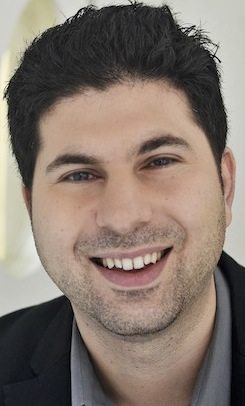
BOOST Collaborative’s Program Coordinator Rachel Ruiz had the pleasure of interviewing Scott Barry Kaufman, an all around funny and inspiring guy with a Ph.D in Cognitive Psychology from Yale University. Kaufman proposed the Theory of Personal Intelligence, which redefines intelligence as the dynamic interplay of an individual’s engagement and ability over time in the pursuit of personal goals. With this broadened definition, passion and persistence become essential elements of intelligence.
What sparked your interest in the topic of child giftedness?
When I was young I had a learning disability, an auditory disability, and I was placed in special education. I always wondered: What does it mean to be gifted? What does it mean to be learning disabled? I always looked at people of varying ability levels in the classroom. I remember early on I was fascinated with the causes of these differences and how mutable they were.
What have you learned about yourself through your research?
I learned so much about myself through just persevering in the education system. I learned so much about how I can exceed the expectations of others when I had the learning disabled label on me. Then when I did the research, it was quite evident that there were all these skills and characteristics that people can apply to achieve their goals and can far surpass expectations based on standardized tests.
Was there anyone in particular growing up who was a role model to you or who encouraged you to pursue your dreams?
There were lots of people in my childhood who played significant roles. One was a teacher who came into the special education classroom in 9th grade and took me aside and asked me why I was still in special education. By that point I was very bored and wanted more intellectual challenges but I didn’t question the system. She questioned it and it really caused me to question what was possible. There was also a gifted education teacher – my senior of high school I decided I wanted to be part of gifted education before I left school and even though I didn’t officially make the IQ cut, she let me join her classroom the entire year with the other gifted kids and made me feel “really” gifted for that year. I was getting straight A’s and was clearly capable but my IQ scores from when I was 11 years old took priority over that. She took sympathy for that and really believed in me and let me into her classroom.
Are you comfortable today taking tests or how has that experience changed the way you take tests?
Thankfully I haven’t had to take an IQ test since I was 11 years old. I didn’t do too well on my SAT and GRE and I kept having to go through an alternate route to show what I was capable of achieving. In terms of life tests I think I’m doing okay.
What do you mean by that?
If you give me an IQ test today, I don’t know, I might totally bomb it. Does it matter? Did it stop me from getting a Ph.D from Yale? So life tests are what you actually achieve, what you actually do in terms of what matters. If you’re doing things that matter, that should supersede your so-called “potential”.
What would you say to education policy makers about adjusting standardized testing?
I have so many public policy recommendations. There’s the question of “Are standardized tests useless?” and the answer to that is no. They’re not useless. They can be a valuable tool to assess knowledge and what sort of level of intervention is needed for a student. The question is how should these tests be used? There’s one function of standardized testing to have some kind of metric across the nation to ensure that students are learning the material – a way of objectively identifying that. But there’s also examples of these tests being used in harmful ways when they are used to indicate a student’s potential, what they’re capable of achieving intellectually and creatively, as opposed to just in the moment looking to see what it says about where the child is and what resources the child needs.
If I was working with public policy makers, I would want them to really understand the latest developmental psychology research and an understanding of what potential means and how it is always a moving target. What is important is engagement in that process, activating or inspiring students to want to put in the effort to do well and to take into account contextual factors in the school culture and teacher training on understanding all these elements. I wouldn’t call for a ban of standardized tests. I think there needs to be a much deeper analysis and understanding of the use of these tests and the way they can be really damaging to allowing students to flourish. So that’s my simple answer. I also have a longer one I’m happy to tell you someday.
If you could be any super hero, who would it be?
(Laughs) I think I’d be Spider-Man! You know how Peter Parker was bullied when he was young? And everyone made fun of him and then he got stung by a spider and then from that moment, he realized he had these super powers. I feel like that’s me. Before 9th grade, I was constantly bullied and told I was stupid and my teacher didn’t think that about me. She wasn’t a radioactive spider but she did take me aside and questioned my place in the universe and suddenly I discovered I had all these powers that I didn’t know I had within me, that I didn’t know I was capable of.
It would also be really cool to be able to climb buildings. And shoot webs.
You can get all the policy makers in your web and change the world.
Yeah, that’d be awesome!
What inspires you?
(Pause) Can I be corny? You know, there’s something about seeing the twinkle in someone’s eyes when they feel inspired that inspires me. I feel like I really get inspired when I see other people inspired. There’s this afterschool program that I work with in New York City called The Future Project (www.thefutureproject.org). The project puts Dream Directors in schools. Any student in the school can tell the Dream Director their dream and then they pair them up with a mentor and work on a significant project that transforms the community. When these students complete their projects, it inspires the rest of the kids in school because they see what’s possible. Inspiration is contagious. You can definitely quote me on that.
How do you think out-of-school time program providers can use your research to improve their work?
I think that afterschool programs have this great latitude that the school day doesn’t have to put into practice a lot of the latest research on harmonious passion. This kind of passion that I talk about in Ungifted is passion that is well integrated into yourself. You have this great sense of autonomy and competence. It’s not “Oh, I play basketball.” No, it’s “I am a basketball player.” And this integration into identity is really, really important to one’s social and emotional development. There is research where they took two groups of kids. One group was made of students labeled gifted and the other were students in afterschool programs like music and art. They found a very stark difference between the two groups in terms of their satisfaction and their motivation. The fundamental basic human needs for competence and autonomy of the afterschool students were being met. In contrast, the students labeled gifted really disliked school and didn’t feel much of a personal connection to what they were doing. But the students in afterschool programs were the complete opposite. They talked a lot about and used the word “love” – loving themselves and loving what they were doing because what they were doing was part of themselves. I wish regular school programs took their cue! But maybe that’s asking too much…
What did you have for breakfast this morning?
I love these questions! I had coffee and a sesame bagel with vegetable spread. Yeah, the bagel was heated. It was good. (Laughs) I also had a power bar – a coconut power bar. There you go! A complete answer.
To purchase Scott Barry Kaufman’s book Ungifted, please click here. To learn more about what Scott is up to, read his blog Beautiful Minds.
Author Profile: @boost-collaborative
